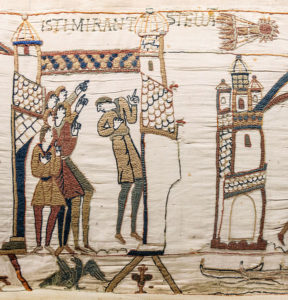Why We Like It: “A Detail from the Bayeux Tapestry, 11th c.” by Jacques J. Rancourt
2 Minutes Read Time
Managing Editor Lisa Ampleman: Jacques J. Rancourt’s fabulous poem “A Detail from the Bayeux Tapestry, 11th c.” from Issue 16.1 announces in its title that it’s in the ekphrastic mode, describing a work of art, in this case a piece of embroidery more than two hundred feet long that extols the Norman takeover of England in 1066. But the poem moves beyond simple description, employing the tools of the best ekphrastic work:

First, he includes enough description for us to know what we’re looking at, but not so much that it takes over the poem. The first tercet opens with a fabulous bit of inverted syntax that creates an iambic rhythm for the first line: “Auspiciously a comet hangs / in the tabby linen / above King Harold.” He’s found the unique element in the tapestry, the detail that will pull us in. Later, he also describes “ghost ships” on the sea and “horses midgallop,” more expected details of the piece.
But the poem moves beyond the tapestry, using the descriptions to pull in other content, like the Hale-Bopp comet of 1997 and the Heaven’s Gate cult who committed suicide in the belief that they’d be called into “the spaceship trailing // the comet’s wake.” The speaker also mentions a cousin’s funeral, which took place at the same time, “the air thick / with peepers.” Although it begins in the tapestry’s scene, the poem spins out wider and wider in its subject matter.
There’s a larger concern here; as the speaker notes, “all art once / was about conquest.” This poem doesn’t attempt conquest; instead, it questions it, implicates the pursuit of conquest in the tragedies, both social (cult suicide) and personal (cousin’s funeral), that result.
And, as the best poems do, the speaker self-implicates:
history will remember
those horses
even as time robs
the yarn of its dye
even as I place
my hand to the glass
The speaker seems to take action at the end, reaching out toward the tapestry, but it’s an interrupted gesture. Instead, the speaker is part of that passage of time, an observer, without agency. I remember what “the aunties” say earlier in the poem, at the funeral: “You’ll never live to see this again.” Rather than conquest, the poem highlights our limitations—we live only so long, and we can’t always touch/affect what we’d like.
